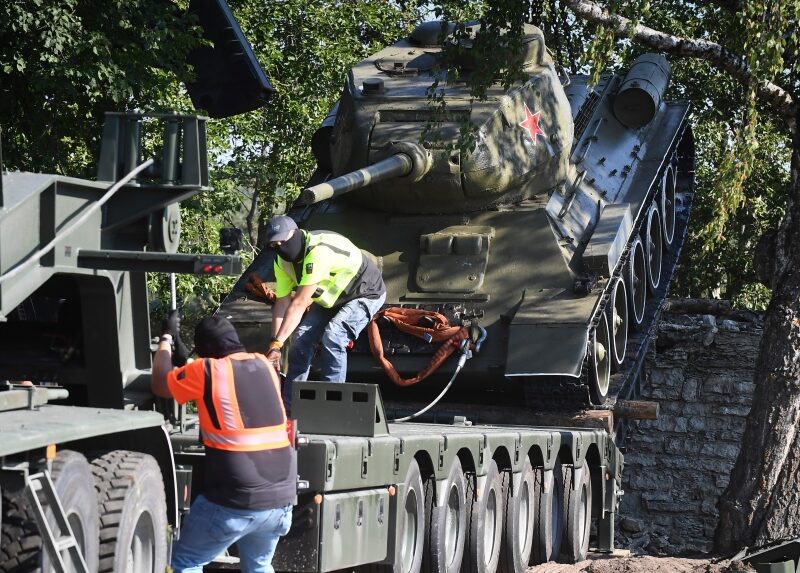[ad_1]
COPENHAGEN, Denmark –
Estonia’s government said Tuesday it has decided to remove a Soviet-era monument from public space in an eastern border town sitting in the Baltic country’s Russian-speaking part, with the prime minister saying the reason for the dismantling is that it represents a risk for public order.
“No one wants to see our militant and hostile neighbor foment tensions in our home,” Prime Minister Kaja Kallas said, adding the move came following Russia’s invasion of Ukraine. “We will not afford Russia the opportunity to use the past to disturb the peace in Estonia.”
Kallas said they didn’t want to give Russia the opportunity of “tearing open old wounds.”
Outside Narva — Estonia’s third largest town with a large Russian speaking population — a replica of a T-34 tank with a red Soviet star sits atop a monument commemorating the Soviet soldiers who died freeing Estonia from Nazi Germany during World War II.
The replica of the Soviet tank will be taken to the Estonian War Museum in Viimsi, a town north of the capital, Tallinn, the Estonian broadcaster ERR said.
The town, whose 57,500 inhabitants are chiefly Russian speakers, sits on the border with Russia about 210 kilometres (130 miles) east of Tallinn, and is separated by the Russian town of Ivangorod by the Narva river.
The whole monument was being dismantled Tuesday and “the operation will be carried out in a dignified manner, for example, the flowers and the candles placed at the monuments will be taken to a cemetery, not thrown in the trash,” Interior Minister Lauri Laanemets said Tuesday, according to the Baltic News Service. Estonian broadcaster ERR said the dismantling was underway.
Photos posted on the ERR web site showed Estonian military and heavy machinery moving the monument after flowers and candles had been removed from the site.
The common grave of the victims of World War II in Narva will get a neutral grave marker and it will remain a dignified site for commemorating them, Kallas said.
Foreign Minister Urmas Reinsalu said in a government statement that Russia “wanted to use the memorials commemorating the criminal occupation regime to fuel tensions in Estonian society.”
On Aug. 15, the town council in Narva decided the monument should be removed and shortly after a crowd gathered around the monument to protest the plan.
Considering the current situation, ensuring public order is complicated for the authorities of the city of Narva,” Laanemets said in the same statement, and called it a “a great and complex issue.”
A total of seven Soviet-era monuments in Narva also would be removed, the government said Tuesday.
Since winning independence in 1991, the former Soviet republic of 1.3 million people has been entangled in disputes over the status of Russians, most of whom came to Estonia during the 50 years of Soviet rule.
In 2007, the relocation of the so-called Bronze Statue of Tallinn, another Soviet war memorial, from a city park led to days of rioting. One person died and more than 1,000 arrests were made, with Russian-speaking Estonians claiming the removal of the memorial erased their history. The statue was later moved to a military cemetery.

